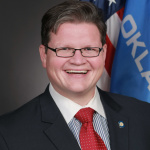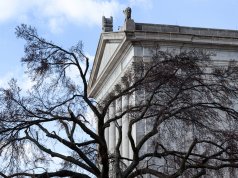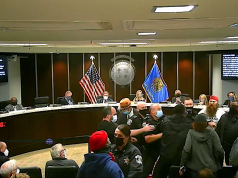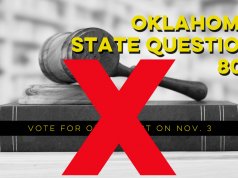Checks and balances. Win some, lose some.
Following last week’s advancement of two bills that potentially threaten Oklahomans’ health in more ways than one, the state’s Legislature managed to move forward at least two bills that should result in positive gains for the Sooner State. Of course, the week also featured a revisiting of our government’s ongoing struggle with the concept of church-state separation.
WTF: Ten Commandments statue revisited
For about two and a-half hours Wednesday morning, you may have heard a percussive boom emanating from Northwest 23rd Street and Lincoln Boulevard, but it wasn’t from fracking-related earthquakes nor early spring thunderstorms. Instead, that low pounding sound was merely ongoing Bible thumping from lawmakers keen to pander to a base composed of the religious-right.
RELATED
Ten Commandments: Reactions spur moral discussion
by Gary Peluso-Verdend
Because, if the Oklahoma Constitution nor the Oklahoma Supreme Court will support you and your constituents’ Bible thumping, then all that’s left for a legislator to do is try to get the state Constitution changed. To that end, lawmakers in the House who supported placing a statue of the Ten Commandments in front of the Capitol building passed Rep. John Paul Jordan’s (R-Yukon) proposed HJR 1062 with a vote of 86-10 on Wednesday.

Ultimately, HJR 1062 would create a ballot initiative if approved by the Senate. That ballot initiative would have Oklahomans vote on whether to repeal Article 2, Section 5 of the state constitution, which prohibits the use of state assets for religious purposes.
Ironically, repeal of the section would pave the way for the Ten Commandments monument to return, but it would also open a door for the Baphomet monument proposed by the Satanic Temple.
FTW: House supports loosening CBD oil restrictions
Among the legislative winners this week, HB 2835 seeks to expand eligibility for patients for whom the prescription of cannabidiol oil (CBD oil) would be beneficial. It passed the House on Tuesday with a vote of 89-6. Jon Echols’ (R-OKC) bill removes the age limitation for eligibility in CBD oil trials, thereby allowing greater access to the drug for disease treatments ranging from Alzheimer’s to intractable vomiting. Previously, CBD oil treatment in a clinical setting was only available to children under the age of 18 in what became known as Katie’s Law. HB 2835 would expand eligibility to include adults and would take effect Nov. 1, if passed by the Senate and signed into law by the governor.
Given last week’s advancement of proposed legislation that would potentially remove Medicaid coverage for more than 111,000 Oklahomans, more than half of whom are single mothers, any health-related bills that potentially expand treatment options could be viewed as a win.
FTW: State’s prisons may finally get some relief
Also constituting a win, a spate of criminal-justice reform bills advanced in the House early during the week, largely owing to Rep. Pam Peterson (R-Tulsa) carrying most of the following:
- HB 2472: would increase District Attorney discretion for filing misdemeanor charges
- HB 2479: would reduce mandatory punishments for subsequent drug offenses
- HB 2751: would raise the property crime threshold from $500 to $1,000
- HB 2753: would reduce mandatory sentences for simple drug possessions
- HB 3146: would expand eligibility for drug courts and community sentencing
With prisons at reportedly 123 percent of capacity and Oklahoma leading the country in female incarceration, Gov. Mary Fallin has praised lawmakers’ efforts to relieve the strain on the state’s corrections department. Further, these reforms have received support from various business groups as well as community activists.
Shortly after NonDoc’s launch, Rep. Jason Dunnington (D-OKC) submitted a commentary urging bipartisan support for criminal-justice reform measures.
Former Speaker of the House Kris Steele has also offered support for criminal justice reform on NonDoc, and he remains a vocal leader on the topic statewide.
ESAs DOA
HB 2949 and SB 609, two polarizing bills that mainly concerned the creation of education savings accounts, were not heard by the end of session in either chamber, thus missing Thursday’s deadline for third readings and effectively killing them (but we’ll probably post something about them later today anyway).
First new law of 2016
Last, despite taking a spin on the Constitutional hamster wheel and slogging through all the cumbersome legislative wrangling that goes into getting abstract ideas made into actual laws, the first bill of the 2016 session was signed into law by Gov. Fallin on Monday. SB 1570 merges the Will Rogers Memorial Commission with the Oklahoma Historical Society.
That reminds me of a fitting quote from the cowboy commentator:
“Why don’t they pass a constitutional amendment prohibiting anybody from learning anything? If it works as well as prohibition did, in five years Americans would be the smartest race of people on Earth.”





















